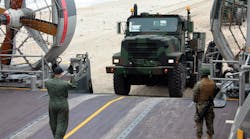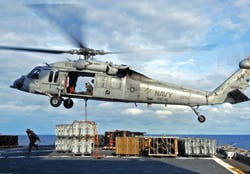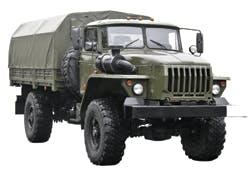Lt. General Gus Pagonis: "The Military's Gift to Logistics is Its People"
Lt. General Gus Pagonis may have retired from military service, but his expertise leading people through difficult environments still represents active duty for this Gulf War veteran. He not only headed the logistical effort during that conflict in 1991, but upon his return to civilian life he applied his leadership talent to turning Sears' logistics service around during the remainder of the 1990s. Today Pagonis teaches a leadership course at Penn State's Business School, and consults with large corporations. He earned both a Bachelor's degree in Transportation and Traffic Management and a Master's degree in Business Administration from Pennsylvania State University.
He is a frequent lecturer on logistics and is the author of Moving Mountains: Lessons in Leadership and Logistics from the Gulf War.
Pagonis shared his insights with MH&L in an exclusive interview touching on the world's hot spots and how American military supply chain expertise has improved in those environments. He talks about the downside of future defense budget cuts as well as the upside for civilian employers longing for the kind of talent likely to be liberated.
MH&L: The media have been shining their spotlights on military logistics over the last couple decades, starting with the first Gulf War. The global geopolitical situation has certainly gotten more complicated since then, especially with developments in Europe, with Ukraine in the middle of an East/West tug of war and in Africa with starving populations at the mercy of tribal factions.
Should the U.S. military be applying its logistics capabilities to support our interests in these struggles?
Pagonis: One of our biggest mistakes is not learning from history. Every new generation insists on doing it their way without looking back at repercussions and lessons learned from the past. Where Ukraine is concerned, the Russian government has some kind of game plan to win back their lost Soviet Union. I think they'll do it in steps. The first was the Black Sea portion of the Ukraine. I don't know how we could support Ukraine logistically, with our armed forces being cut dramatically.
They've also cut into the logistical side. We are dependent on civilian logistics to complementmilitary logistics, which is not a bad concept. In the first Gulf War we probably had 40,000 contractors, Pakistani and Bangladeshi, who drove trucks under the supervision of military sergeants and lieutenants. You can do that here, but it's the lifeline of getting there halfway around the world. Someone has to decide what our commitment is and what we can and can't do.
The Ukrainians need ammunition and weapon systems and logistically you have to deliver that, but that's how arms stores get built up and conflicts get exacerbated. You can provide logistical support in a humanitarian role very well with the Red Cross and with food. But look at history.
When you dump all kinds of humanitarian support into a theater of operation, will it get to the right people? We're not very good at that. We're great at loading up C-141s and ships and deploying them rapidly with wheat, corn and medical supplies, but you get them into the theater of operations and you're dependent on the indigenous personnel to distribute it. That's when black markets get developed. This is not a minor undertaking. The easy part is getting stuff over there. If the US wanted to they could mobilize enough aircraft and ships to move all kinds of tonnage, but when it gets there it has to be offloaded. The port situation in Ukraine is controlled by Russians now so you're landlocked getting in there.
MH&L: What did you take away from your experience with military logistics that you've applied in civilian life, and how is technology R&D being applied between those two worlds?
There's a very small difference between military and civilian supply chain. Instead of moving ammunition, fuel and medical supplies, the same concepts of warehousing, transportation, integration and inventory management are exactly the same. Military R&D is not being done in the military; it's being done by the civilian sector. A hundred years ago almost all our R&D, including radar and sonar, were discovered by the military and perfected during the World War II era. In the 1960s they shifted the R&D and now there's not much R&D being done by military people. It's done by civilians. Even the weapon systems are being designed and deployed by civilians based on parameters from the military. But there are two big differences. The military has the financing and they can handle large-scale operations. The supply chain principals are the same, but the magnitude becomes much larger. Military logisticians are used to that: moving thousands of tons of supplies and storing them where there's no storage. Go into the desert and you don't have the luxury of trees to cut down and build warehouses. But the military has been trained to capture what's there and reuse it. That's the biggest distinction between military and civilian logistics.
When I was at Sears in charge of the supply chain it was so enjoyable because it was kind of small. My civilian counterparts thought I had a huge operation with 2,000 warehouses and a billion dollars in transportation management. That wasn't huge in comparison to the military. So what civilians can learn from that is operating large-scale operations. The functions are the same. I did not find much difference in the supply chain functions between the military and civilian world.
Continued pg 2
MH&L: The big challenge on both sides seems to be talent. What's your take on putting veterans back to work in civilian logistics?
Pagonis: I brought a lot of military people into Sears. They already had a program for recruiting military and I just amplified it. First, you get a young man or woman who's capable of handling stress in difficult situations; they've been exposed to it quite a bit. Second, they are able to handle multi-functional tasking without difficulty and turf battles. In the civilian sector your biggest challenge is that warehouse guys don't talk to transportation and transportation guys don't talk to the inventory managers. They end up suboptimizing and you can't do that in a military environment. These kids come in from the military with those walls broken down—let's just get the job done. They give you the tremendous assets of handling stressful situations and more than one thing at a time.
MH&L: What about the education component?
Pagonis: Today you can get a supply chain degree. When I graduated from Penn State back in the ‘60s I had a degree in transportation. Then it progressed and Penn State was one of the leaders in having a logistics degree. Now almost all your top schools provide supply chain majors. It used to be people went into the supply chain from other disciplines—finance, accounting, marketing, sales—and they evolved into logistics and learned the trade on the run and did very well at it. However, they didn't have that intuitive experience and expertise.
I am very impressed with these young kids who select supply chain as a major. What you don't have coming out of schools is the same classroom. When you enter the supply chain you'll be placed either in inventory, transportation or warehousing. In the military most of your logisticians have all three. In a short career period they'll be involved in inventory, transportation and warehousing and the integration of those three functions. That's the big advantage of hiring a veteran who served in supply chain. In the first Gulf War [General Norman] Schwarzkopf allowed me to place people wherever I needed them. Integrated into the logistics branch, they learn all the functions of the supply chain.
MH&L: Is that underappreciated on the civilian side?
Pagonis: Very few civilian employers understand the breadth of expertise and knowledge these people are exposed to in military supply chain functions. In the first Gulf War I must have done 2,000 interviews on the talk shows. Schwarzkopf wanted it that way. He didn't want the combat arms guys letting out any secrets and he figured, who cared about logistics? Every day I did these things and the word “logistics” was thrown around quite a bit in the news media because for six months the whole buildup was logistics. You hardly saw anything about the combat arms side.
Then the war only lasted 100 hours because we were able to get behind the enemy by using secret logistical bases. Then all of a sudden we withdrew. Logistics got entrenched in the military and in the civilian sectors during that period. Now supply chain has taken over and every kid I've placed in supply chain jobs on the civilian side has done extremely well.
MH&L: How do you counter the concern about post traumatic stress disorders?
Pagonis: We've had that in every war in our history. It's just that now it gets more news coverage.
In the last ten years we haven't had a lot of combat-on-combat confrontation. In the first Gulf War that was the last massive force. We had 520,000 troops on the ground, 400,000 of whom were soldiers. The rest were airmen, some sea and coast guard. We had a force-on-force battle. In the second Gulf War there was a force-on-force battle but it ended after they captured Saddam Hussein. But ten years since then all the combat has been vehicles being blown up and young kids being exposed to those ramifications. On the plus side it was good that people got this coverage because people are dealing with it much better with the hospitals and sociologists and psychiatrists, but on the other side it puts up a huge red flag that makes people assume every veteran has a PTSD, which is not true. But that's a tough one to crack because of the coverage.
Continued pg 3
MH&L: How is military technology being adapted to civilian life?
Pagonis: Information technology is the cement that holds all the functions together in the supply chain. We didn't have GPS or cell phones in the first Gulf War and computers were in big refrigerated trucks. Everybody wanted to be in the IT field because of that. Now all of that is on a laptop and these young men and women are the same people from civilian life who entered the military with great skill sets at handling IT. And think about it, we have drones searching areas with people behind computers watching them, covering a wide area. That will hit in the civilian sector, which will take it even further. The people in the military have that technology training. They have it as normal kids in the U.S. The downside is they're not learning to communicate verbally or how to make presentations. They can't write or spell because they don't have to. Their skill sets in dealing with people are a challenge too. But in the military, they must learn those skills, as well as learning how to read body language.
MH&L: Are you optimistic about where this country is headed?
Pagonis: I'm optimistic about our greatest asset which is our youth. They're better than we ever were as kids. And we're better than our parents were. That's our strongest asset. When I talk to young kids out of school they want to be the CEO in a few years. They don't realize they must pay their dues in various levels before they can get right to the top. That's tough for succession planning. My generation might have wanted to be the CEO but we never said that.
On the downside, we can't cut defense any more. It's difficult when you don't have a land force to be able to go to Congress and present your case for your budget. We could not put together a massive armed force as we did in the first Gulf War. We'd have to call up everybody who served who still breathes and walks and then we'd have to retrain them, then make sure they're in shape.
We've become very dependent on air strikes, guided missiles and drones and it's hard to defend a large land force when there's not another large land force you'll be pitted against. If Russia gets back the satellites that were part of the Soviet Union, that could become a large massive land force. Our youth can do great things, but the defense budget has been cut way too far; we're down by 3,000 officers. The plus of that is if industry embraces them they'll be great assets for them.






